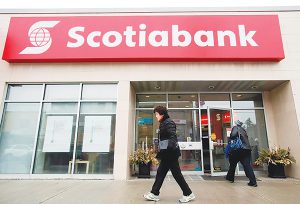Bloomberg
Bank of Nova Scotia, the Canadian bank with the largest exposure to Latin America, sold $750 million of loss-absorbing hybrid securities amid mounting concerns about the spillover effects of US Federal Reserve rate hikes on emerging-market economies.
Scotiabank priced 60-year so-called limited recourse capital notes at a yield of 8.625%, down from around 8.75% initially discussed. That’s an extra yield of 50 basis points compared to Toronto-Dominion Bank’s $1.75 billion issuance of the securities earlier this month.
“We think Scotia should trade somewhat outside of Toronto-Dominion,†said Peter Simon, a New York-based analyst at CreditSights Inc. in a note to investors before the deal was priced. “We see value up to 8.55%.â€
The yield of a Bloomberg index of BBB rated bonds issued by banks reached 6.78%, the highest since 2010, as investors fret about global financial stability. Scotiabank’s new notes, which are eligible for its Additional Tier 1 buffers, are also expected to be rated BBB- by S&P Global Ratings, its lowest investment grade. That’s one step lower than TD’s notes priced early this month.
Scotiabank’s transaction got an order book equivalent to 2.4 times the deal size, according to Bloomberg News strategist Brian Smith.
The lender issued last year $600 million of LRCNs at a yield of 3.625%, in the first sale of sale of such securities issued by Canadian banks in the US currency.
Scotiabank generated almost a third of its revenue from its Latin America-focused international unit in its most recent
fiscal year.
Financing in Latin America is becoming more expensive as major central banks raise interest rates to tame inflation and to contain reduced investor appetite for riskier assets, the International Monetary Fund said last week. AT1s, the riskiest form of bank debt, have been sold in various denominations in Europe, Asia and the US. The securities seek to transfer risk during times of firm-level financial distress to creditors and potentially away from taxpayers.
A representative from Scotiabank didn’t immediately provide a comment.
 The Gulf Time Newspaper One of the finest business newspapers in the UAE brought to you by our professional writers and editors.
The Gulf Time Newspaper One of the finest business newspapers in the UAE brought to you by our professional writers and editors.
